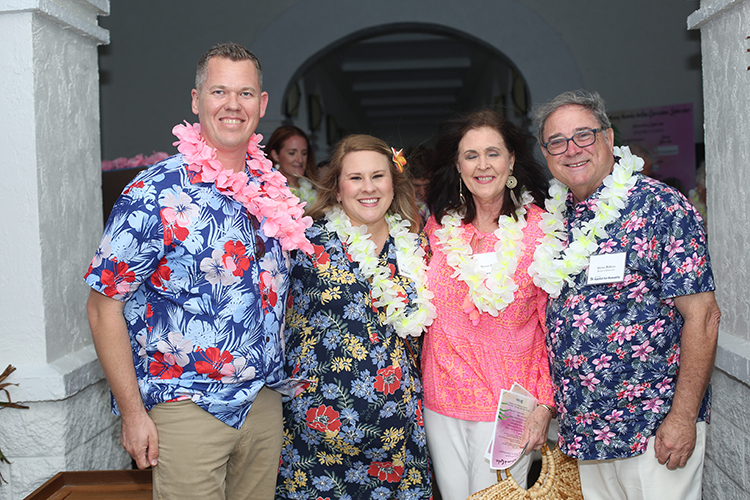Not even a Florida monsoon could dampen the spirits of guests arriving for the Habitat for Humanity Island Gala, held at Grand Harbor Beach Club. Each person was graciously greeted by smiling Hawaiian hula dancers, who placed festive leis around their necks and ushered them inside the clubhouse, where others were excitedly mingling, laughing and swaying to the sounds of Aloha Islanders Hawaiian Entertainment.
Although originally scheduled to be held outside by the pool, event organizers quickly moved everything under cover. A few umbrellas did sail off into the ocean and the entertainment tent toppled, but otherwise, the revelers continued to be caught up in the enchanting dance performances that featured the hula girls and conch-blowing island men.
Trevor Loomis, CEO of Indian River Habitat for Humanity, took the stage to thank the sponsors and attendees for coming to this party with a purpose – to raise funds for home ownership, repairs and scholarships.
“This is our big fundraiser, and we couldn’t hold it last year because of COVID,” said Loomis.
“Yet in spite of that, thanks to our generous donors, we were able to continue to build and repair homes for families in need. By putting in sweat equity and working for their homes they became homeowners, and they now have a foundation to build the future. We’ve built 500 homes in Indian River County the last 30 years and completed 1,000 repairs through our neighborhood revitalization program,” said Loomis.
“This year the rising cost of construction materials has been a challenge. There’s been a 30 to 40 percent increase in the cost of lumber, and land values have increased six times. A lot that used to cost us $5,000 now costs us $30,000. Rents have gone up 42 percent, making affordable housing nearly impossible to find. That’s why your donation is needed more than ever.”
Habitat for Humanity homes are not given away. They are purchased through zero-profit, zero-interest mortgages. In lieu of a down payment, homebuyers contribute hundreds of hours of sweat equity.
Acceptance into the program is determined by the applicant’s need for affordable housing, their ability to pay for and maintain the home, their willingness to complete 300 to 500 hours of sweat equity, and their willingness to complete all financial management and homeownership classes.
“Your contribution is an investment in your community, with all money recycled right back into our programs,” Loomis explained.
“Some of it goes into our scholarship program, which assists our homeowners and their families with early education expenses and even college. It’s the key to breaking the cycle of generational poverty.”
Guests at the Island Gala enjoyed cocktails and an endless buffet of island inspired cuisine, before some fierce bidding on must-have auction items, and a clever win/win wall of prizes.
For more information, visit IRCHabitat.org.
Photos by Kaila Jones

